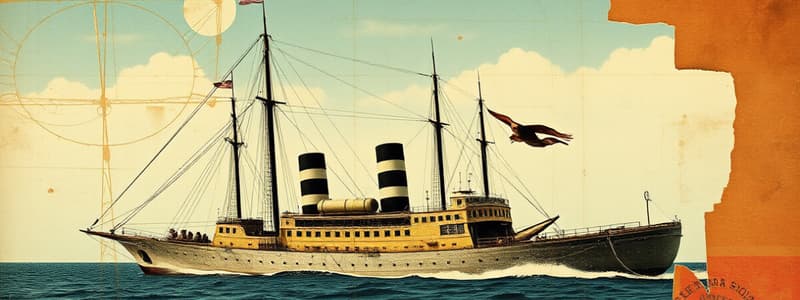Podcast
Questions and Answers
What is the purpose of sound signals in navigation?
What is the purpose of sound signals in navigation?
- To indicate the weight and size of the vessel
- To communicate with other vessels using lights
- To ensure safe navigation and prevent collisions at sea (correct)
- To demonstrate compliance with local fishing regulations
Which sound signal is required for a vessel that is underway?
Which sound signal is required for a vessel that is underway?
- No signal is required
- 1 prolonged blast at intervals of 2 minutes (correct)
- 1 short blast at 1-minute intervals
- 5 short blasts on the whistle
What sound signal indicates that a fishing vessel is in the area?
What sound signal indicates that a fishing vessel is in the area?
- 2 prolonged blasts followed by 1 short blast
- 1 short blast followed by 1 prolonged blast
- 5 short blasts followed by a prolonged blast
- 1 prolonged blast followed by 2 short blasts (correct)
In a head-on approach, what sound signal should a vessel make to indicate a desire to alter course to starboard?
In a head-on approach, what sound signal should a vessel make to indicate a desire to alter course to starboard?
When should a vessel that is moored signal for other vessels?
When should a vessel that is moored signal for other vessels?
What does a towing vessel signal when towing ahead?
What does a towing vessel signal when towing ahead?
What sound signal should a power-driven vessel make in restricted visibility?
What sound signal should a power-driven vessel make in restricted visibility?
What sound signal indicates a vessel constrained by draft?
What sound signal indicates a vessel constrained by draft?
Flashcards are hidden until you start studying
Study Notes
Navigation Rules
- Purpose: Ensure safe navigation and prevent collisions at sea.
- Application: Rules apply to all vessels upon the waters of the United States and its territories.
- Responsible Parties: Both commercial and recreational vessels must adhere to sound signal regulations.
Sound Signal Types
-
Whistle Signals:
- Short Blast: Approximately 1 second duration.
- Prolonged Blast: Approximately 4-6 seconds duration.
-
Types of Signals:
- Distress Signal:
- 5 or more short blasts on the whistle.
- Underway:
- 1 prolonged blast at intervals of 2 minutes.
- Moored:
- Not required to signal while at anchor unless in a crowded area.
- Vessels Constrained by Draft:
- 1 prolonged blast followed by 2 short blasts (for vessels restricted in their ability to maneuver).
- Distress Signal:
-
Meeting Situations:
- Head-on Approach:
- 1 prolonged blast to indicate a desire to alter course to starboard.
- Crossing Situation:
- Give way vessel: 1 short blast to indicate intention to pass on the port side.
- Stand-on vessel: 2 short blasts to indicate passing on the starboard side.
- Head-on Approach:
-
Sound Signals in Restricted Visibility:
- Power-driven Vessels: 1 prolonged blast every 2 minutes.
- Sailing Vessels: 1 prolonged blast followed by 2 short blasts every 2 minutes.
-
Special Signals:
- Fishing Vessels:
- 1 prolonged blast followed by 2 short blasts indicates they are fishing in the area.
- Towing Vessels:
- 1 prolonged blast followed by 1 short blast if towing alongside, 1 prolonged followed by 2 short blasts for towing ahead.
- Fishing Vessels:
Summary
- Sound signals are crucial for marine communication to prevent collisions.
- Different situations dictate specific sound signals, helping vessels understand intent and maneuver safely.
Navigation Rules
- Designed to ensure safe navigation and prevent maritime collisions.
- Applicable to all vessels in U.S. waters and territories.
- All vessels, whether commercial or recreational, are required to follow sound signal regulations.
Sound Signal Types
-
Whistle Signals:
- Short Blast: Duration of approximately 1 second.
- Prolonged Blast: Duration of approximately 4-6 seconds.
-
Types of Signals:
- Distress Signal: Consists of 5 or more short blasts on the whistle.
- Underway: Requires 1 prolonged blast at intervals of 2 minutes.
- Moored: No signaling required while at anchor unless in crowded areas.
- Vessels Constrained by Draft: Use 1 prolonged blast followed by 2 short blasts.
Meeting Situations
- Head-on Approach: Use 1 prolonged blast to indicate a desire to change course to starboard.
- Crossing Situation:
- Give Way Vessel: 1 short blast indicates intention to pass on the port side.
- Stand-on Vessel: 2 short blasts indicate passing on the starboard side.
Sound Signals in Restricted Visibility
- Power-driven Vessels: Sound 1 prolonged blast every 2 minutes.
- Sailing Vessels: Sound 1 prolonged blast followed by 2 short blasts every 2 minutes.
Special Signals
- Fishing Vessels: 1 prolonged blast followed by 2 short blasts signals fishing activity in the area.
- Towing Vessels:
- 1 prolonged blast followed by 1 short blast indicates towing alongside.
- 1 prolonged blast followed by 2 short blasts signals towing ahead.
Summary
- Sound signals are essential for marine communication, playing a vital role in collision prevention.
- Specific sound signals are dictated by various maritime situations, guiding vessels in understanding each other's intentions and navigating safely.
Studying That Suits You
Use AI to generate personalized quizzes and flashcards to suit your learning preferences.




